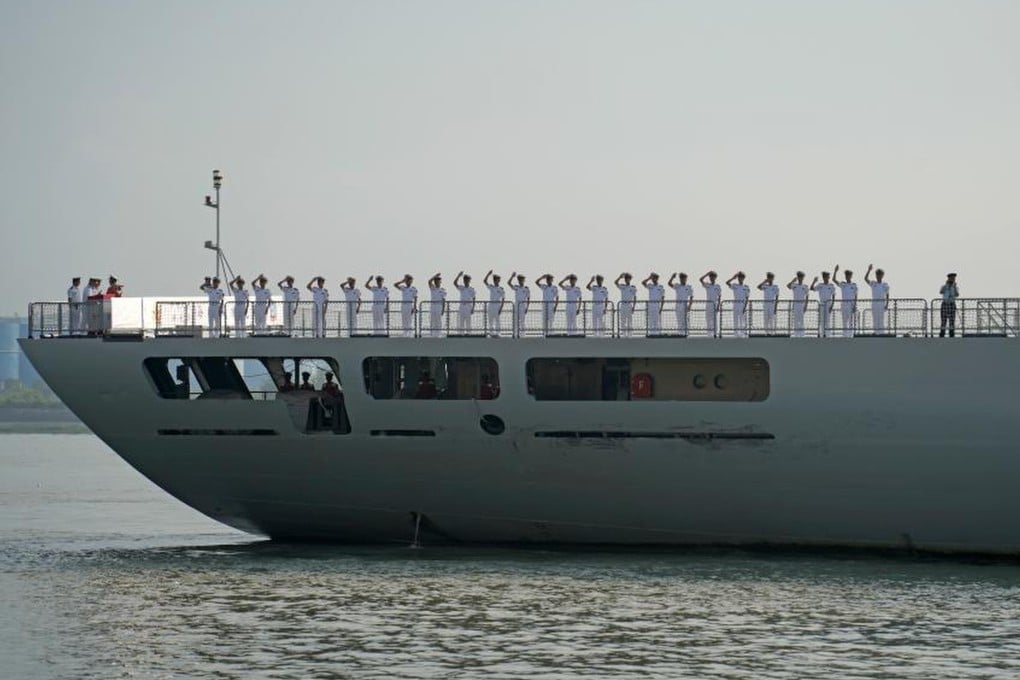24 Oct 2024 - {{hitsCtrl.values.hits}}
 SCMP - Chinese navy ships docked in Bangladesh last weekend, sending ripples through Indian Ocean geopolitics – and raising eyebrows in New Delhi.
SCMP - Chinese navy ships docked in Bangladesh last weekend, sending ripples through Indian Ocean geopolitics – and raising eyebrows in New Delhi.
The visit marked the first time foreign vessels had set anchor in the South Asian nation under its new interim government, which took power after the ousting of former leader Sheikh Hasina in August amid student-led protests.
China’s ambassador to Bangladesh, Yao Wen, emphasised that the port call showed relations would continue to grow regardless of recent political shifts.
Chinese naval training ship Qi Jiguang and amphibious dock landing ship Jinggangshan arrived in Chittagong on October 12 for what China’s defence ministry called a three-day goodwill visit.
The aim of the visit, which includes courtesy calls, was to deepen mutual understanding and strengthen cooperation with the Bangladesh Navy as part of efforts to build “a maritime community with a shared future”, the ministry said.
However, India views the visit “as part of a continuous Chinese build-up in Bangladesh”, said Frédéric Grare, a senior research fellow at the Australian National University’s National Security College.
“The visit marks a continuity, not a qualitative change in the nature of the relationship China intends to maintain with Dhaka,” he said. “Delhi should and is probably worried about the overall dynamic and uncomfortable with the present uncertainty.”
Grare said Beijing was eager to establish good relations with the new authorities in Dhaka, a move likely to be welcomed by the interim government led by Nobel laureate Muhammad Yunus.
China has stepped up its defence engagement with South Asian nations in recent months, said Viraj Solanki, a research fellow at the International Institute for Strategic Studies who specialises in regional defence, strategy and diplomacy.
This includes the construction of a submarine base in Bangladesh, commissioned in March last year, to house the country’s two Chinese Ming-class submarines.

“These facilities can also host Chinese research vessels, whose increasing presence in the Indian Ocean, particularly around the Maldives and Sri Lanka, is a growing concern for New Delhi,” Solanki said.
“This follows a trend of Beijing enhancing its defence and security cooperation with Dhaka,” Solanki said, adding that a Chinese naval ship had also docked in Colombo recently.
Sri Lanka’s Foreign Minister Vijitha Herath said the Chinese vessel – a triple-masted tall ship with 130 crew known as the Po Lang – was given permission to dock as it was classified as a “a training vessel and not a research craft”.
The Indian Ocean island nation earlier imposed a one-year ban on foreign research ships due to security concerns raised by India and the United States. The number of Chinese research vessels visiting Sri Lanka and the Maldives was “a growing concern for New Delhi”, Solanki said.

Bangladesh and China also held their first bilateral military training exercise this year. The Golden Friendship joint drills, held in May, were “based on United Nations peacekeeping anti-terrorism operations”, according to Chinese defence ministry spokesman Wu Qian, who said the exercises included “the rescue of hostages on buses and the clean-up of terrorist camps”.
In response to China’s increased naval activity, India has ramped up its own defence collaborations with neighbouring countries to “show itself as a reliable and effective partner”, Solanki said.
“This has increased focus on New Delhi enhancing maritime security cooperation,” he said.
Earlier this month, India and the Maldives issued a joint vision document to enhance maritime security cooperation, following talks between Prime Minister Narendra Modi and Maldivian President Mohamed Muizzu.
Additionally, India and Sri Lanka launched a Maritime Rescue Coordination Centre in June – comprising centres in Hambantota and at the Sri Lanka Navy’s headquarters in Colombo – further solidifying their security partnership.
India, Sri Lanka and the Maldives also established the Colombo Security Conclave in 2020 to broaden their trilateral discussions on maritime cooperation, with Mauritius joining the grouping in 2022.
Bangladesh and China had signed several economic agreements just months before the political upheaval in Dhaka, said Pooja Bhatt, an associate professor at the Jindal School of International Affairs in India.
Beijing was no doubt keen to continue these engagements and revive its military ties with Bangladesh under its new interim government, she said.
Relations between India and Bangladesh hit an “all-time low” recently, according to Lailufar Yasmin, a professor of international relations at the University of Dhaka, who argues that the arrival of Chinese vessels should prompt Delhi to reassess its relationship with the new Bangladeshi government.
“India should start recognising the rationale behind the Bangladesh revolution instead of pointing fingers at external actors,” she said, referring to the recent political upheaval.
“It should also carefully consider the overwhelming support that the new regime of Bangladesh received worldwide, including in China … [and] should carefully recalibrate its relationship with Bangladesh 2.0.”
The fallout from Hasina’s ousting has strained ties between the two South Asian neighbours, amid allegations of human rights abuses such as extrajudicial killings and the mass detention of political opponents during her tenure.
She is believed to be living in India as a fugitive, with her extradition being sought by a tribunal, further complicating the bilateral relationship.
Chinese ambassador Yao’s description of Bangladesh as the “Pearl of the Bay of Bengal” highlights the country’s strategic significance in the intricate dance of power and influence that defines the region’s geopolitical landscape, Yasmin said.
“Domestic changes in Bangladesh do not necessarily diminish its strategic significance to the great powers. China’s naval diplomacy in Bangladesh is a testament to this,” she said.
22 Dec 2024 22 Dec 2024
22 Dec 2024 22 Dec 2024
22 Dec 2024 22 Dec 2024
22 Dec 2024 22 Dec 2024
22 Dec 2024 22 Dec 2024